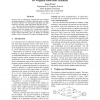Free Online Productivity Tools
i2Speak
i2Symbol
i2OCR
iTex2Img
iWeb2Print
iWeb2Shot
i2Type
iPdf2Split
iPdf2Merge
i2Bopomofo
i2Arabic
i2Style
i2Image
i2PDF
iLatex2Rtf
Sci2ools
112
click to vote
NAACL
2003
2003
Simpler and More General Minimization for Weighted Finite-State Automata
Previous work on minimizing weighted finite-state automata (including transducers) is limited to particular types of weights. We present efficient new minimization algorithms that apply much more generally, while being simpler and about as fast. We also point out theoretical limits on minimization algorithms. We characterize the kind of “well-behaved” weight semirings where our methods work. Outside these semirings, minimization is not well-defined (in the sense of producing a unique minimal automaton), and even finding the minimum number of states is in general NP-complete and inapproximable.
Minimization Algorithms | NAACL 2003 | NAACL 2007 | Unique Minimal Automaton | Weighted finite-state Automata |
| Added | 31 Oct 2010 |
| Updated | 31 Oct 2010 |
| Type | Conference |
| Year | 2003 |
| Where | NAACL |
| Authors | Jason Eisner |
Comments (0)

